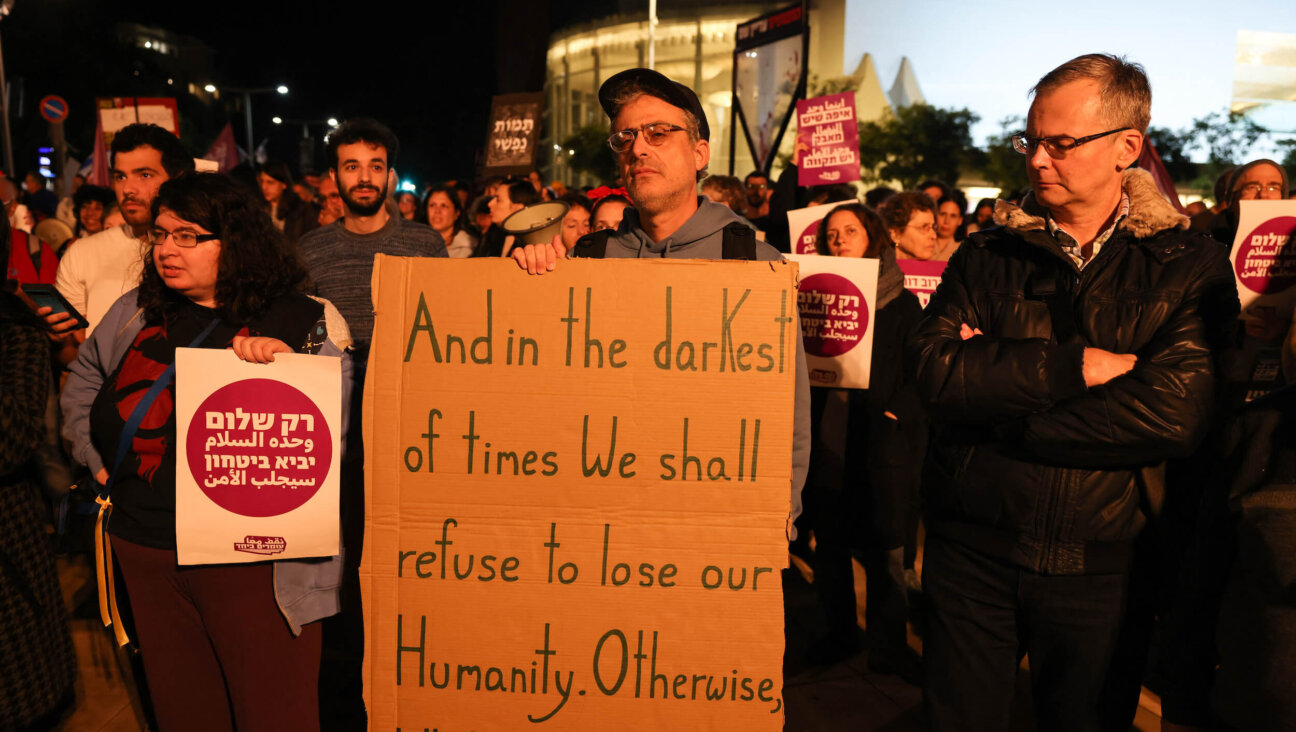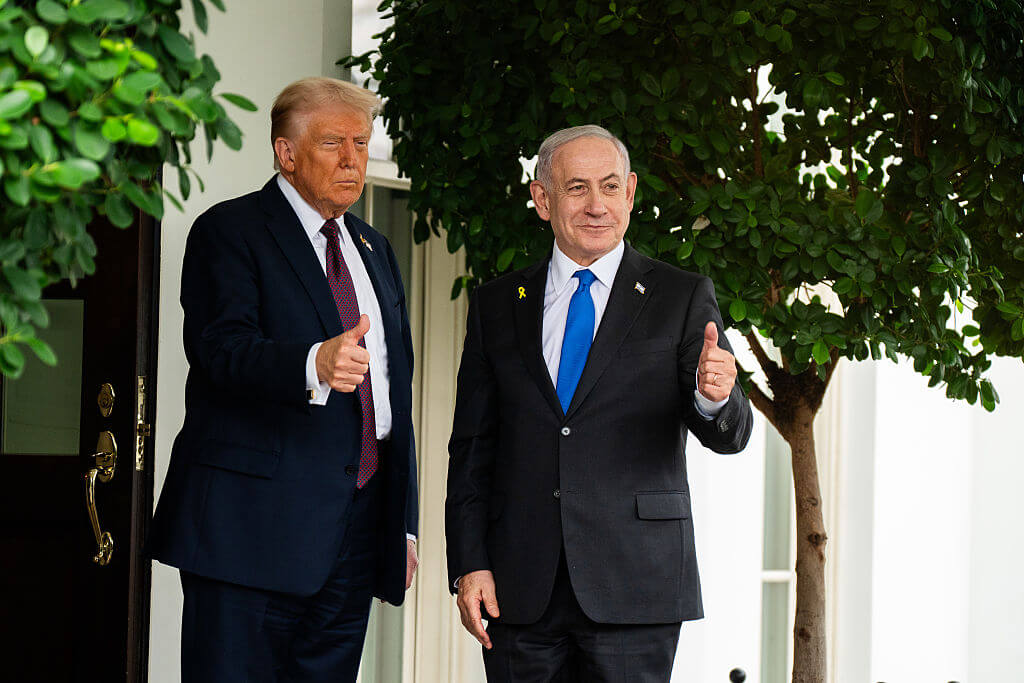Jewish Schools Ramp Up Security After Newtown

First Day Back: A Newtown student peers out of a school bus. Schools were open for the first time in the Connecticut town since the deadly rampage on Friday. Image by getty images
Like many other mothers, Patti Weiss Levy’s heart broke when she heard about last Friday’s shooting at Sandy Hook Elementary School in Newtown, Conn.
The longtime Connecticut resident lives an hour away from Newtown, so she assumed she wouldn’t know anyone involved. But as details of the massacre began to emerge, Weiss Levy says she realized just how small Connecticut is.
“We later found out my daughter babysat for one of the children killed,” Weiss Levy told JTA. “And the drummer in my daughter’s band could not attend a concert that night because his sister was one of the teachers killed, too. They were the nicest people, and this whole thing is horrid, just unspeakable.”
As the funerals began Monday for the 20 children and six adults gunned down last Friday by 20-year-old Adam Lanzo, Jewish schools around the country grappled with how to discuss the tragedy appropriately with students and whether there were ways to improve security at their own schools.
Administration officials at the Bicultural Day School in Stamford, Conn., some 30 miles from Newtown, spent all of Monday combing the grounds with security experts, one faculty member told JTA. The entire staff arrived at the school early in the morning for a meeting about how to discuss the Newtown massacre with their students. This week, the staff’s main concern was to make sure their building had the best security system possible.
The school also had a personal connection to Newtown: A teacher at Bicultural is married to Rabbi Shaul Praver, who led the funeral service for one of the victims, 6-year-old Noah Pozner.
Around the country, parents of Jewish school students expressed concerns about security. At the Hillel Day School in Boca Raton, Fla., school officials said they received a torrent of emails from parents requesting that they update their security system and emergency procedures. Head of School Rabbi Samuel Levine said the school was considering its options.
“Our school building is on the Jewish federation campus, so you would have to pass through security,” Levine said Monday. “But that doesn’t mean that if someone wanted to get on campus, they couldn’t. We’re sitting down with campus security this afternoon to review our security procedures and drills and see if there are any changes we can make.”
David Finell, head of school at the Rockwern Academy in Cincinnati, said the shooting generated a new sense of urgency to review security precautions.
“When you have this type of tragedy, it makes people revisit their procedures,” Finell said. “We run plenty of emergency drills, but after this we are going to start having more and we’re going to implement some new security changes, though I can’t share what they are right now.”
When it came to talking with students, Jewish administrators took different approaches to discussing the Newtown shooting. The question was how to talk to students in an effective and appropriate way while also taking care not to alarm younger students unnecessarily. Ramaz, a Modern Orthodox school in New York, ran an extensive program for middle and high school students and made faculty members available to speak with anyone who requested it. Ramaz did not provide the program for younger children.
“A lot of our students seem to have been taken with the tragic events, so we encouraged feelings of sympathy for the victims and their families, and made sure the students felt our school was safe,” said Rabbi Paul Shaviv, noting that teachers were prepared to talk to the younger children if they asked questions.
Boca’s Hillel School addressed the tragedy in a morning assembly for the middle school and dispatched school psychologists to talk to the lower grades.
“We need to be sensitive to the younger children,” Levine said. “I’m sure there was plenty of discussion about this over the Shabbos table, and there were probably kids present.”
At the Levine Academy in Dallas, Head of School Mark Stolovitsky said that in seeking an age-appropriate way to talk about the shooting, the events in Connecticut were explained in terms of Bible or Disney stories. Like the stories of Purim or Passover, the children understand the concept of a “bad guy,” he said. “We want kids to feel safe in school, but we also need to tell kids that there are bad men who do bad things,” he said.
Levine Academy is also considering a new school entrance strategy. Currently, only one of the school’s two entrances is guarded by armed security. After the shooting, Stolovitsky said his staff will explore ways for all all students to enter through the same door.
“I also think we need to change our mindset and be more vigilant,” Stolovitsky said. “Make sure you stop people wandering around your school you don’t recognize, even if they are smiling. And we need to keep practicing emergency drills, where children know how to hide out of plain sight. This is why we have drills. It’s unlikely it will happen, but we need to be prepared.”
While hiring armed guards and improving security systems might be obvious steps, school administrators also say they don’t want to turn their facilities into fortified prisons. Levine noted that at Sandy Hook Elementary, the shooter, Lanza, was able to force his way inside despite the school’s impressive security system.
“The Connecticut school was locked. They did all the right things, and this somehow happened,” Levine said.
“We have security cameras, we feel safe,” Stolovitsky added. “We could choose to have metal detectors and provide a whole new stage of security. But we live in an open, free society and this is a school. The security needs to be appropriate.”
Finell says the most important role for educators or parents briefing kids about the shooting is to remain calm. At his school, teachers led discussions about the shooting but waited for children in younger grades to initiate. The school is also planning an optional memorial service. Finell stressed the importance of not getting too visibly emotional.
“These kids are looking to us for their emotional cues,” he said. “We can’t show any fear or let them know how upset we are by all of this. We need to be reassuring at times like these and talk to them about all the safety precautions we are doing, show them that our No. 1 goal is to take care of them.”













